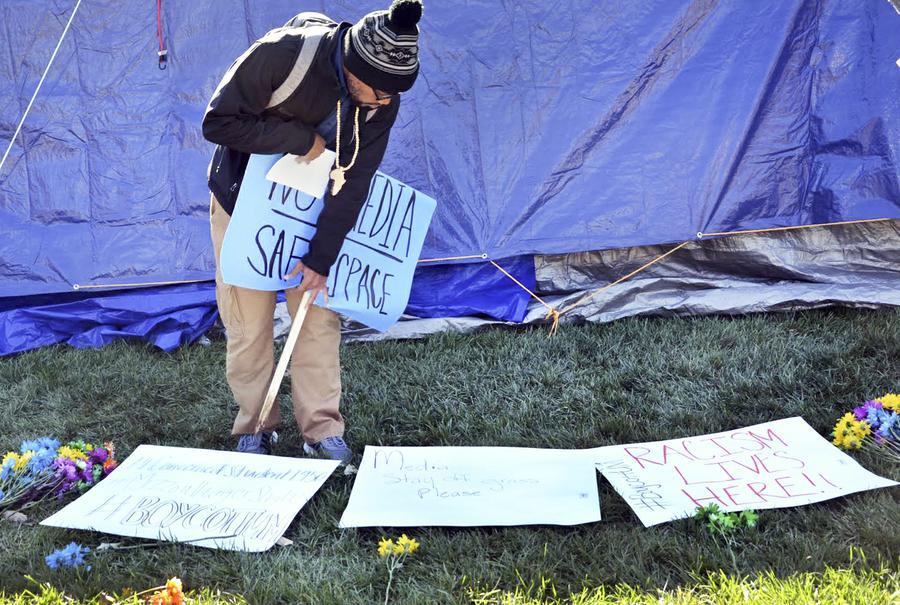
Reports of Concerned Student 1950 supporters’ attempts to block media access during [demonstrations Nov. 9](https://www.themaneater.com/stories/2015/11/10/nov-9-chronological-play-play/) quickly overshadowed the news of former UM System President Tim Wolfe’s resignation in the national media. The move prompted a national conversation on First Amendment rights and safe spaces.
Several MU employees have [received backlash](https://www.themaneater.com/stories/2015/11/10/petitions-started-remove-two-mu-employees-after-in/) after video surfaced of them and other demonstrators squaring off with journalists. The students camping on Carnahan Quad had put signs declaring the site a media-free safe space.
The student activists shifted gears Nov. 10. Leaders of the movement opened the campsite up to the media and handed out a flier to the campsite occupants that read: “TEACHABLE MOMENT 1. Media has a First Amendment right to occupy campsite 2. The media is important to tell our story and experiences at Mizzou to the whole world 3. Let’s welcome and thank them!”
Members of Concerned Student 1950 explained they were originally concerned with the media getting the story right, which is why they urged supporters at Monday’s demonstration not to comment to reporters.
A student occupant of the campsite explained that media should speak directly with the original organizers of Concerned Student 1950 if they wanted to understand the movement.
“The original organizers have a legitimate and authentic reason as to why (the movement started), and it goes much further than Concerned Student 1950, it starts with the MU4MikeBrown movement on campus,” she said. “We want to make sure that everybody understands the real reason, the beginning reason, and how it has flowed down a timeline of things, in sequence.”
The student demonstrators also said that they had tried to keep the media out of the campsite because of safety concerns.
“Some people’s identities and lives are on the line for these types of things, so we want it to be safe,” she said. “This is some people’s home now. You see tents, people lay their heads here now, like me, so it’s kind of an invasion of your home.”
She explained that they understood they were using a public space, but that at the same time, they wanted it to be a risk-free space that was treated with respect.
“Those are the only things we want: respect, to get the story right and for people to understand that this is a safe space,” the student said.
The next day, Nov. 11, Young Americans for Liberty [held a Free Speech Wall event](https://www.themaneater.com/stories/2015/11/17/young-americans-liberty-organize-free-speech-wall-/) on Lowry Mall, adding to the dialogue on campus about the First Amendment. Organizers encouraged all passers-by to “exercise their First Amendment rights” by writing whatever they wanted on the wall.
Caleb Mundwiller, a freshman political science major and member of the group, explained they had been planning the event far before MU became the center of a national debate on the First Amendment and the timing was coincidental.
He said Young Americans for Liberty is a group on campus that works to bridge the divide between Democrats and Republicans.
The event’s message was on open dialogue and the benefits of conversation, organizers said. They told participants that if they were critical of something to not scratch it out, but instead write why they were critical of it.
“We’ve had people from all spectrums — people that are with Concerned Student 1950 and exercised their right … and we’ve had a bunch of people talk bad things about CS1950, so it’s been a really good unifier,” he said.
Mundwiller said that through the event, organizers had been able to discuss and explain the idea of free speech to many people.
“‘Our rights are protected, not given to us’ is what a lot of people are realizing today,” he said. “So, whenever they come over here and we tell them that, it’s kind of like a light bulb goes off and they’re like, ‘Oh, that makes sense. Like, I’m an individual, this is my right as an individual to speak my mind and say what I want.”
He said Concerned Student 1950 demonstrators have shown just how the right to free speech works through their recent demonstrations.
“They were marching over campus, even here near Memorial Union, saying, ‘We shut shit down, we shut shit down,’” he said. “They can say that because it’s their free speech, they can go around and protest, they can send letters to everybody in the administration they want to be resigned or fired, and that is their free speech that lets them do that.”
Sandy Davidson, professor of communications law at the School of Journalism, explained, explained, however, that speech that jeopardizes someone’s wellbeing can sometimes be considered punishable.
If the speech is threatening to a reasonable person, it’s generally not protected, she said. She said speech that includes ‘fighting words’ said face-to-face can be regarded as a peace disturbance, which can make it criminal.
Davidson explained that at the same time, the First Amendment protects speech that might be unpopular.
“The First Amendment wasn’t created to protect pretty speech,” she said.
She also emphasized that speech can cross an ethical line far before a legal line.
“On a university campus we should try to elevate the ethical standards,” Davidson said. “We should have respect.”